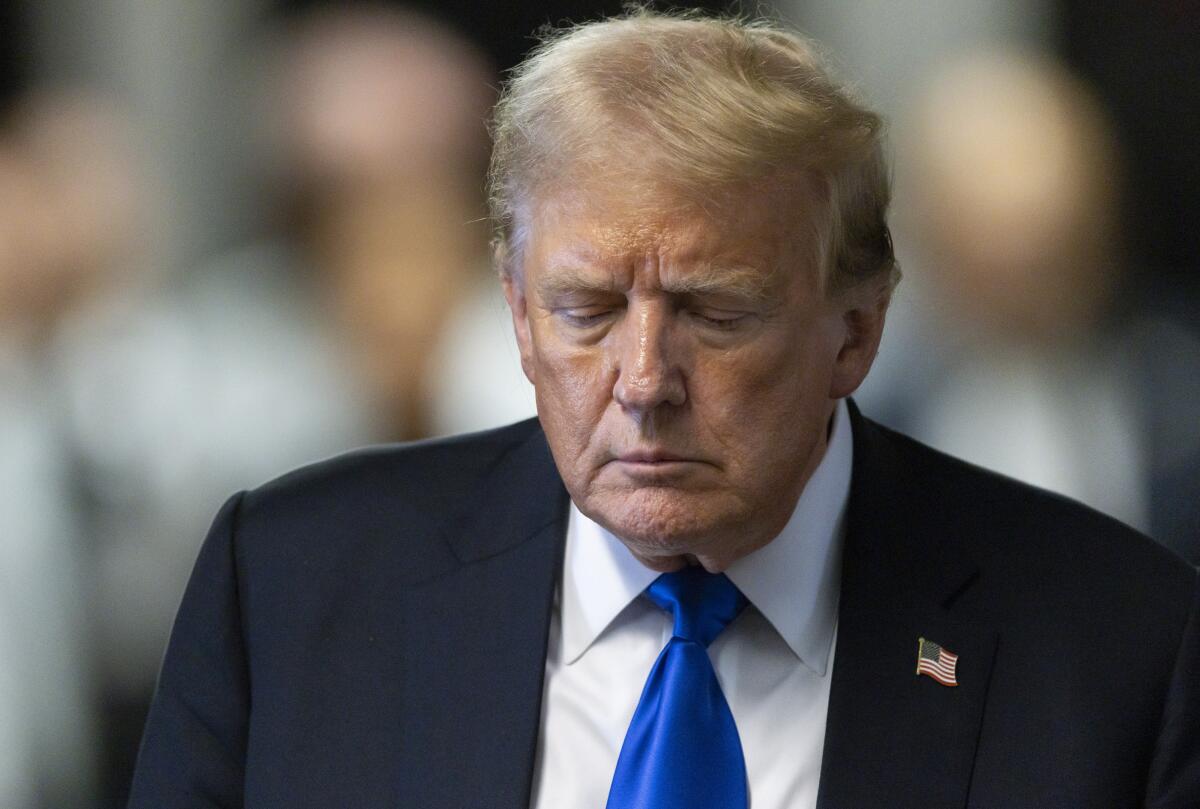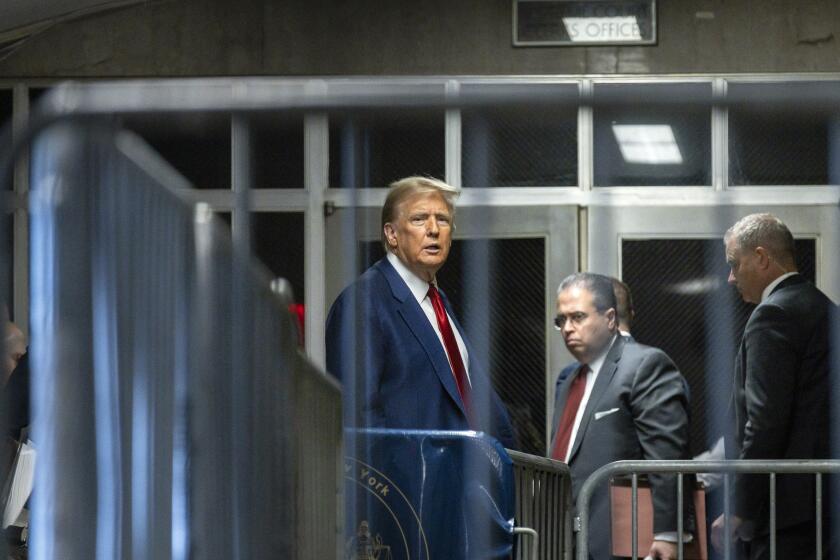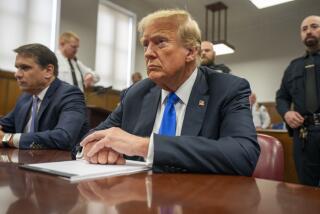Column: Does it matter that Donald Trump just became a convicted criminal? Of course it does

Itâs of course true that come Nov. 5, the nationâs voters could well decide to shrug off the historic guilty verdict that a Manhattan jury rendered against Donald Trump on Thursday afternoon. And that is the conclusion many have already reached about the seismic event that just took place in Room 1530 of the Manhattan Criminal Courthouse: Itâs hollow unless it ignites the will to deliver a popular denunciation of the former president this fall.
That analysis is, in my view, myopic.
Itâs always been the case that the American people can override the rule of law â a normally slight risk that has roared forward in recent years under the whip hand of a would-be tyrant. Thatâs the message that a furious and ashen Trump delivered when he emerged from the courtroom where a jury of seven men and five women gave the prosecution all it asked for by convicting him on 34 felony counts. âThe real verdict,â Trump barked, âis going to be November 5th by the people.â
In fact, the jury that delivered the real verdict, and the judge who presided over the hush money trial and is expected to sentence him in July, did their work conscientiously and even doggedly under a hailstorm of insults and threats from the defendant and his supporters. We have for years hoped for such a measure of accountability for the unrepentant former president. It finally arrived, and the center held.
New York prosecutors presented a credible narrative. The defense relied mainly on undermining prosecution witnesses such as Stormy Daniels and Michael Cohen.
Unlike the insults, the accolades showered on the jurors and Judge Juan M. Merchan are more than deserved. Having attended most of the trial, I think their seriousness of purpose matched the gravity of their duties.
But it wasnât just the determination of the jury, judge and prosecutors that forced Trump to endure weeks of damning testimony in person and to now face at least the possibility of a short prison term. And it wasnât just the resolve of the witnesses, some of whom retain loyalty or at least affection for Trump but understood their legal duty to testify truthfully.
Merchanâs firm hold of the reins bolstered his authority, but what really made the difference was his robe, or what his robe represents. Trump was forced to submit to a whole regime that ultimately springs from our deepest constitutional values of fairness and equality before the law. How galling for a man who holds such deep contempt for â indeed seems incapable of apprehending â the rule of law rather than men.
Even as the ex-president got a bond reduced in New York, Judge Juan M. Merchan set a trial date in the hush money case, upbraided the defense and imposed a gag order.
Now what? First of all, Trump is an altered figure in the eyes of that law. No longer presumed innocent, he is proven guilty, a convict, a serial offender. And like any other convict, he will have to sit down for an interview with the probation office, which will prepare a report and recommendation for the judge based on its assessment of Trumpâs offenses and his acceptance of responsibility, among other factors. That doesnât augur well for a man who has spent a lifetime failing to own up to misconduct.
Merchan set sentencing for July 11, when he may well take into account Trumpâs perverse lack of remorse and contempt for the system that convicted him. The sentence will be at the discretion of the judge, who will no doubt strive to handle it as he would for any other similarly convicted felon.
Next will come the inevitable appeal of the conviction, in which Trumpâs lawyers will likely allege that the trial was tainted by several serious errors. And the legal issues here were complicated enough to present a risk of reversal regardless of how Merchan handled them.
But the measured pace of justice has finally ceased to serve Trumpâs interests in this case. It will be a year and a half or more before there is any possibility of a reversal of the sentence or conviction. By then, Trump figures to be either a convict in other forums â and todayâs groundbreaking result can only make convictions in his three other criminal cases more plausible â or a president taking a wrecking ball to the entire legal system.
Again, though, that prospect has always been on the horizon. The full and fair operation of the rule of law to hold a former president accountable, however, was not.
On the contrary, it has often seemed over the last few years as if some combination of power-mongering, legal bluster, friends in high places (some of them wearing judicial robes) and bizarre good luck would invariably combine to insulate Trump from the law that is supposed to apply to all of us. Indeed, we can fairly expect that at some point in the coming weeks, the U.S. Supreme Court will render an opinion that will serve both to elevate future presidents above the law to an extent and to forestall the most important trial Trump faces, the federal Jan. 6 case, until after the election.
Today, though, the law prevailed in a fashion that was at the same time basic and majestic. Trump received a fair trial and due process, no more and no less than the next defendant who will be in the same seat in the same dilapidated courtroom where he spent most of the last six weeks. Given all the powerful forces aligned against the rule of law in recent years, we should see that as nothing less than a triumph in and of itself.
Harry Litman is the host of the âTalking Fedsâ podcast and the Talking San Diego speaker series. @harrylitman
More to Read
A cure for the common opinion
Get thought-provoking perspectives with our weekly newsletter.
You may occasionally receive promotional content from the Los Angeles Times.













